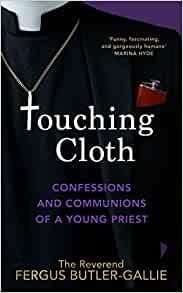The Reverend Fergus Butler-Gallie
Bantam Press, 2023

In a P G Wodehouse story there is a complaint about an “adhesive” person who “scraped an acquaintance”. In February at the meeting of the P G Wodehouse Society I scraped an acquaintance with the Reverend Fergus Butler-Gallie, who was there to receive the Society’s prize for his essay, “The Hour Breeds Thought – Night Time In The Stories Of P. G. Wodehouse.”
I told Fergus that I really enjoyed his writing for which he has a real gift. I asked if he had another book on the way and he said that soon would be published his memories of his first year as a priest. This is that book.
It is an enjoyable read. It is not only for church people because all church concepts and traditions are easily and humorously explained.
In my review of “A Field Guide to the English Clergy” https://adrianvincent.org.uk/a-field-guide-to-the-english-clergy/ I had a nagging reservation about unintentionally ‘mocking the afflicted.’ I had no such qualms with this book because the butt of his humour is usually himself.
He has a perceptive wit combined with an excelled turn of phrase:
“The pair, with a physical size disparity that would have been at home on a seaside postcard of a less enlightened era, were clad in jogging gear.” (Page 12).
“She held out a coin that, even from a distance, I could tell was not British legal tender. It was huge, a dull, worn gold colour, and bore a face that I didn’t immediately recognize but was certain could not be Elizabeth II’s on account of the moustache.” (Pages 59-60).
“Your classic mayor would turn up to the opening of a crisp packet” (Page 81).
Fergus is from the High Church tradition, and wears a black clerical shirt with full circle clerical collar:
“I was never going to be one of those vicars who shoehorn a bit of white plastic into a Hawaiian shirt, least of all when visiting a hospital, but I still try not to cultivate the angel-of-death look, offsetting my sombre dress with a smile. It doesn’t always pay off.” (Page 13).
He reflects on the changed effect that being seen as a clergyman had on people. On the day of his ordination:
“what changed that afternoon in Liverpool was how people saw me. I was no longer just me, a young man who liked beer and lie-ins and stupid videos of people letting off air horns on golf courses but, for better or worse, a symbol of hope to some and hate to others. The old unencumbered me was gone: I had vowed to do and be something more. I’d promised to ‘die to self and live to Christ and my neighbour’.” (Page 16).
His clerical attire does have benefits, for example when he nearly got run over:
“I idled dreamily back towards the church where…I stepped, lightly but with a determined purpose, directly into the path of an oncoming taxi. The vehicle screeched to a stop just short of my shins. The driver, justifiably in retrospect, began to remonstrate…The man caught sight of my collar and a smile spread across his face. The f that was forming across his lips transmuted into ‘Sorry there, Father’, this followed by a making of the sign of the Cross so rapid and practised that it might have qualified as a martial art. I didn’t really know what to do – I continued with my apology, then lifted my fingers in a vague benediction by way of thanks at his generosity in apologizing to me for my own idiocy …it was nothing I as an individual had done that turned his justified fury into a forgiving smile. Once again, it was the collar. It occurred to me that I was being forgiven on borrowed credit…Perhaps a priest who had gone before me…had come up with just the right words at a tragic family funeral…It was that priest he’d seen and forgiven when the collar flashed in front of him, not me.” (Pages 31-33).
The comic incidents are interspersed with some spiritual reflections:
“all of us are better off trying to tread a path of sanctification, trying to love our neighbour, no matter how consistently irritating they may be and no matter how often we slip up while trying to do so.” (Page 63).
The last two chapters are the deepest and end on a poignant note.
The book is a fun read, combined with some depth to ponder. A good combination.
June 2023
Adrian Vincent